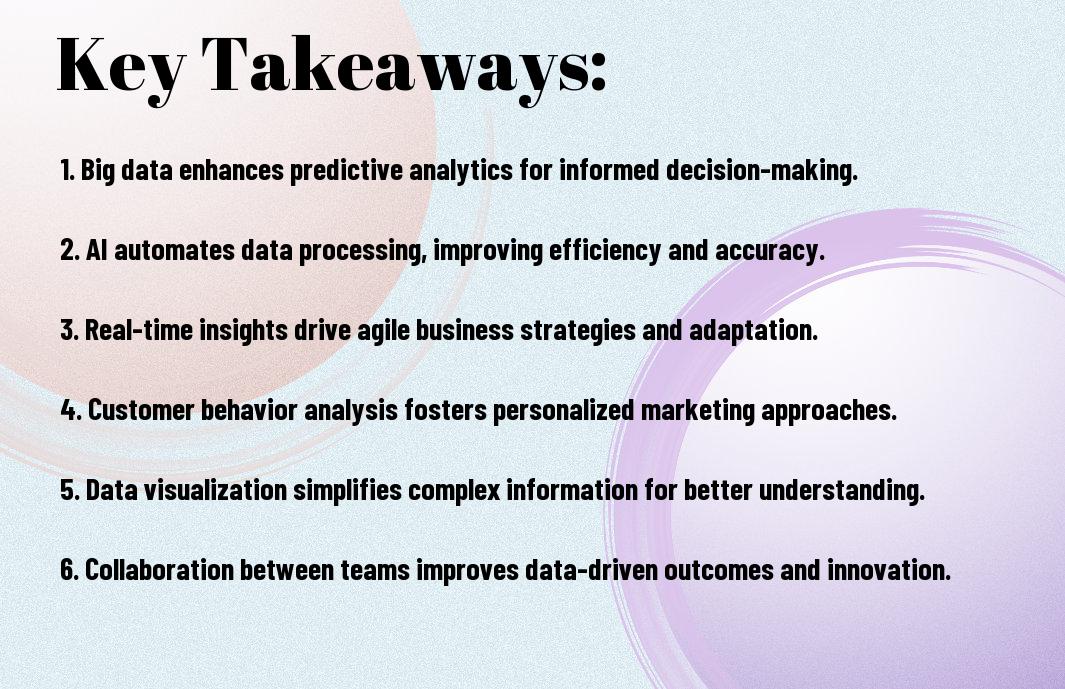As you navigate the complex landscape of modern business, you’re constantly seeking ways to make informed decisions that drive growth and success. Your ability to analyze and interpret vast amounts of data is key to unlocking new opportunities and staying ahead of the competition. With the advent of artificial intelligence (AI), you can now harness the power of big data to gain valuable insights and make smarter business decisions that propel your organization forward.
Key Takeaways:
- Big Data analytics, combined with Artificial Intelligence (AI), enables businesses to make informed decisions by uncovering hidden patterns and insights from large datasets, leading to improved operational efficiency and strategic planning.
- AI-powered tools can process vast amounts of data quickly, providing real-time analytics and facilitating swift decision-making, which is vital for staying competitive in today’s fast-paced business environment.
- By leveraging Big Data and AI, organizations can enhance customer experiences through personalized marketing, improved customer service, and tailored product offerings, ultimately driving business growth and revenue.
- Integrating AI into Big Data analytics helps mitigate risks by identifying potential threats and vulnerabilities, allowing businesses to take proactive measures to prevent data breaches and maintain data integrity.
- Effective implementation of Big Data and AI solutions requires a skilled workforce, ongoing training, and a culture that embraces data-driven decision-making, ensuring that businesses can maximize the benefits of these technologies and achieve long-term success.

The Data Revolution
Before the advent of big data, your business decisions were likely based on limited information and intuition. With the exponential growth of data, you now have the opportunity to make informed decisions, driving your business forward.
From Information Overload to Strategic Asset
Overwhelming amounts of data can be transformed into a valuable resource, helping you to identify trends, patterns, and insights that inform your business strategy, enabling you to stay ahead of the competition.
The Tipping Point in Data Utilization
Any organization can leverage big data to gain a competitive edge, and you are no exception, as you can harness the power of data to optimize operations, improve customer experiences, and drive innovation.
Indeed, as you reach the tipping point in data utilization, you will begin to see significant returns on investment, from increased efficiency to enhanced decision-making capabilities, ultimately leading to improved business outcomes and a stronger market position, allowing you to make the most of your data-driven strategy.
AI as the Modern Business Interpreter
While navigating the complexities of big data, you’ll find that AI plays a significant role in interpreting insights that inform your business decisions, enabling you to make smarter choices.
Machine Learning Fundamentals
About the basics of machine learning, you’ll discover that it involves training algorithms on your data to identify trends and patterns, ultimately enhancing your decision-making process.
Pattern Recognition in Business Contexts
After applying machine learning to your business, you’ll begin to see patterns emerge that can be leveraged to optimize operations, predict customer behavior, and drive growth.
Indeed, as you research deeper into pattern recognition, you’ll find that it allows you to uncover hidden relationships between variables, forecast market shifts, and make data-driven decisions that propel your business forward, giving you a competitive edge in the market and enabling you to achieve your goals more effectively.
Decision-Making Reimagined
Not only does big data provide you with vast amounts of information, but it also enables you to make informed decisions. With AI, your business can analyze complex data sets, identify patterns, and predict outcomes, leading to smarter decision-making.
From Intuition to Algorithm-Assisted Choices
Behind the scenes, AI algorithms process vast amounts of data, providing you with actionable insights that inform your choices. You can now make decisions based on data-driven evidence, rather than relying solely on intuition.
The Human-AI Partnership
About to revolutionize your decision-making process, the collaboration between humans and AI enables you to leverage the strengths of both. You bring expertise and context, while AI provides data-driven insights, resulting in more accurate and informed decisions.
Due to the complementary nature of human and AI capabilities, you can focus on high-level strategic thinking, while AI handles complex data analysis, freeing up your time to drive business growth and innovation. As you navigate the complexities of big data, your partnership with AI will become increasingly vital to making smarter, more informed decisions that drive your business forward.
Implementation Challenges
Despite the potential benefits of big data and AI, you will face several challenges when implementing these technologies in your business. You need to consider the technical, organizational, and cultural hurdles that can hinder the successful adoption of big data and AI solutions.
Technical Hurdles and Solutions
Challenging as it may seem, integrating big data and AI into your existing infrastructure can be overcome with the right strategies and tools. You can leverage cloud-based services, data integration platforms, and AI-powered software to streamline your data management and analysis processes.
Organizational Resistance
With the introduction of new technologies, you may encounter resistance from your employees, particularly those who are accustomed to traditional methods. You should address their concerns and provide training to help them adapt to the changes and understand the benefits of big data and AI.
Also, as you implement big data and AI solutions, you will need to establish clear goals, define new roles and responsibilities, and foster a culture of innovation and experimentation within your organization. You should encourage your employees to explore new ideas and approaches, and provide them with the necessary support and resources to succeed.
Ethical Considerations
Once again, you face a dilemma in using big data and AI, as ethical concerns arise, and you must address them to maintain your business’s integrity and trust with your customers.
Privacy Concerns in the Data Age
Prior to implementing any big data or AI solution, you should consider the potential risks to your customers’ privacy, as their personal data is being collected and analyzed, and you must ensure that you handle it securely and transparently.
Responsible AI Deployment
Around the time you decide to deploy AI in your business, you should think about the potential consequences of your actions, and strive to use AI in a way that benefits both your business and society as a whole, by being mindful of the potential biases and ensuring that your AI systems are fair and transparent.
Considering the potential impact of AI on your business and the world, you should take a proactive approach to responsible AI deployment, by establishing clear guidelines and principles that prioritize fairness, accountability, and transparency, and by continuously monitoring and evaluating the performance of your AI systems to ensure that they align with your values and goals, and you can achieve this by investing in AI solutions that are designed with ethics and social responsibility in mind, and by fostering a culture of accountability and transparency within your organization.

Measuring Impact
After implementing AI-driven decision making, you can assess its effectiveness by checking out Harnessing the Power of Big Data Analytics for Smarter Business Decisions to learn more about the benefits of big data analytics.
ROI of AI-Driven Decision Making
Alongside the implementation, you will notice significant improvements in your business, as AI-driven decision making enhances your ability to make informed decisions, leading to increased efficiency and productivity.
Key Performance Indicators
Beneath the surface of your business operations, you will find that key performance indicators (KPIs) play a significant role in measuring the success of AI-driven decision making, allowing you to track progress and make adjustments as needed.
Decision makers like you rely on KPIs to evaluate the effectiveness of their strategies, and with AI-driven decision making, you can set and track KPIs that align with your business goals, enabling you to make data-driven decisions and drive growth.
To wrap up
Conclusively, you now have the tools to harness the power of big data and AI for smarter business decisions. You can leverage this technology to analyze your data, identify patterns, and make informed decisions that drive your business forward. By utilizing big data and AI, you will be able to optimize your operations, enhance customer experiences, and stay ahead of the competition, ultimately leading to increased success and growth for your business.
FAQ
Q: What is Big Data and how can it be leveraged to make smarter business decisions?
A: Big Data refers to the vast amounts of structured and unstructured data that organizations generate and collect on a daily basis. By harnessing the power of Big Data, businesses can gain valuable insights into customer behavior, market trends, and operational efficiency. With the help of Artificial Intelligence (AI), this data can be analyzed and interpreted to inform strategic decision-making, drive innovation, and optimize business processes. By leveraging Big Data and AI, companies can uncover hidden patterns, predict future outcomes, and make data-driven decisions that drive growth and profitability.
Q: How can AI be used to analyze and interpret Big Data for business insights?
A: AI technologies such as machine learning, natural language processing, and deep learning can be applied to Big Data to uncover insights and patterns that would be impossible for humans to detect. These AI algorithms can process vast amounts of data in real-time, identify correlations and anomalies, and provide predictive analytics that enable businesses to anticipate and respond to changing market conditions. Additionally, AI-powered tools can help to automate data processing, reduce manual errors, and provide scalable solutions for handling large volumes of data. By combining Big Data with AI, businesses can unlock new levels of insight and intelligence that drive informed decision-making.
Q: What are the benefits of using Big Data and AI for business decision-making, and how can organizations get started with implementation?
A: The benefits of using Big Data and AI for business decision-making include improved accuracy, increased efficiency, and enhanced competitiveness. By leveraging these technologies, businesses can gain a deeper understanding of their customers, optimize their operations, and drive innovation. To get started with implementation, organizations should first identify their business goals and objectives, and then assess their current data infrastructure and analytics capabilities. They should also consider investing in AI-powered tools and technologies, such as data management platforms, machine learning algorithms, and data visualization software. Additionally, businesses should develop a data-driven culture that encourages collaboration, experimentation, and continuous learning, and provides the necessary training and support for employees to work effectively with Big Data and AI.



